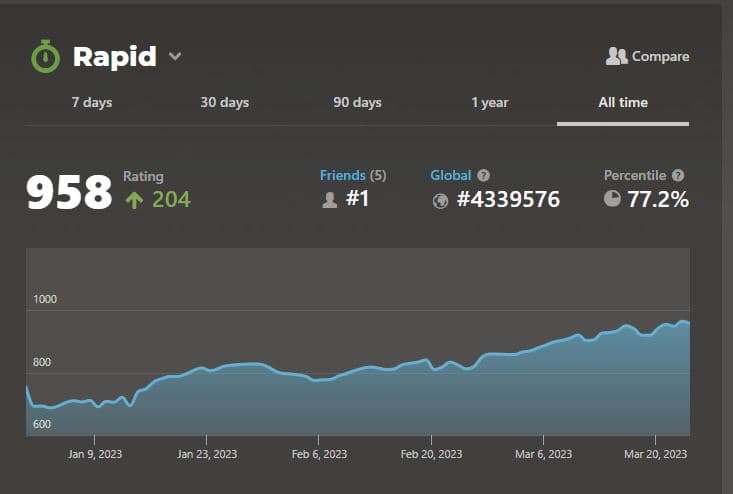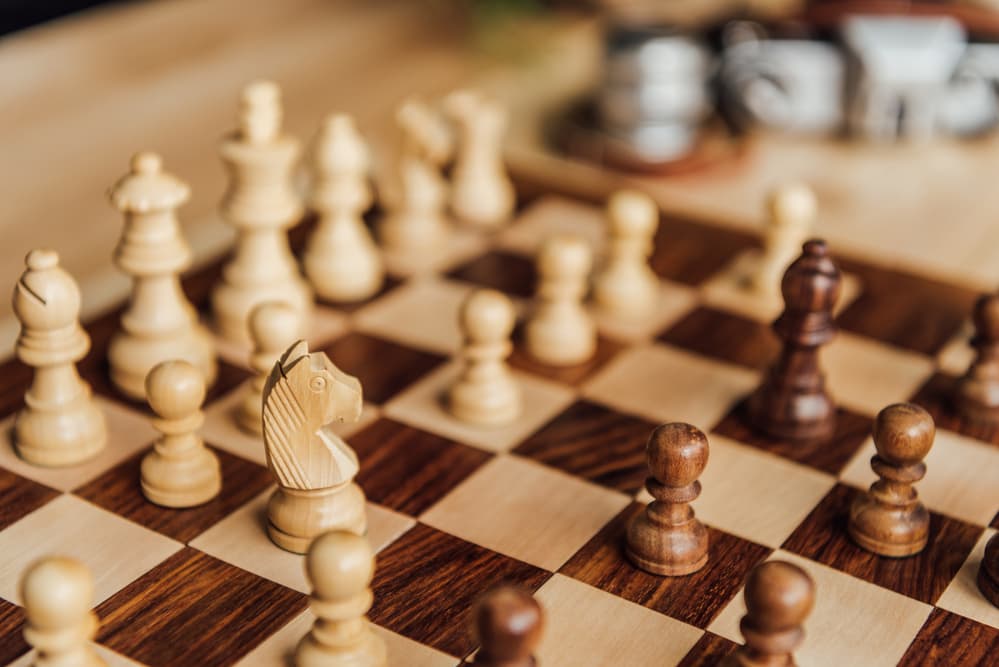Since the start of 2023, I’ve been playing chess on a regular basis. I played it as a child for fun, without any appreciation of openings, middle game or end game strategy. It was something I did at lunch time at school if the field was too wet for us to play football. But I decided to set myself a challenge for 2023 to hit 1,000 rating on Chess.com. For “proper” chess players this isn’t a huge target. But for someone who hasn’t played regularly for decades and in a game that is far more suitable for younger people, its both challenging and realistic enough to motivate me.
As of writing this article and after almost 3 months, I’m hovering around 950 which is pleasing as I’m much farther ahead than I anticipated. But it got me thinking about the skills used in chess and poker and how they can easily transfer between each other. I wondered whether my poker skills have helped me improve quicker. That’s why in this article, I’m going to explain the skills you can use in to be competitive in both games.
Strategy
The great thing about both games is that you can employ different strategies to win. There isn’t a 100% “you must play this way” method that means there is no flexibility. In poker, you can use a looser strategy or a tighter strategy to win. In chess, you can win with an assertive playing style and a counter attacking. Its up to you and its not set in stone as you can change your strategy from one game to the next.
That’s what makes poker and chess so enjoyable, the little nuances that keep the games fun and intellectually stimulating. In both games there is positional awareness and identifying threats. There is the evaluation of risk and playing on opponents’ tendencies.
There is also different levels of complexity to strategy involved. For instance, a poker player can win at micro stakes with solid, but simpler strategy. The same is true at 200 chess ratings. As you improve and move up stakes and ratings, more advanced strategy is required to fend off the competition.
Check out my rating and progress so far below. Feel free to friend me on chess.com. My username is “NarcisoBaldo”.

Psychology
You can’t talk about poker and chess without appreciating the importance of psychology. It is embedded in both games so firmly. In both games, there is pressure on players to make better decisions than their opponents. The player who makes the better decisions will win at chess and in poker (in the long run).
Reading body language and exploiting your opponents’ weaknesses is also important, especially in live games. Whilst this is less of an impact in online games, players can make decisions quicker than opponents which can cause stress. Little elements like this can cause their opponents to make grave mistakes.
Patience
In poker games where players are similar ability, the more patient player will often win. They will wait out for the opportunity to take advantage of a player who doesn’t have the endurance. This can cause a cash game player to lose after a long session or bust out a tournament player. That’s why patience and discipline is critical to the modern-day poker player. But the same patience is also needed for chess. Some games can take 60+ moves each. This can be mentally exhausting and time consuming.
Looking for chances to win whilst simultaneously defending your pieces is a difficult skill to master and patience is required. At the lower rated chess games, blunders are common. These are unenforced errors made by the player. Its just a lack of patience and taking time over decisions.
Game Theory
Game theory can be applied to both chess and poker. If you’ve studied game theory for one, it’ll come natural when you study the other. In chess, you have over 25 well established openings to learn. Learning the openings, their strengths and how to use them in a game is like learning advanced poker concepts like game theory optimal (GTO).
For my mathematical inclined readers, using game theory will certainly help you at the bigger games. I’ve studied a few openings but some of the chess coaches I’ve watched stated that its better to wait until 1,200 + to properly delve into chess game theory.
Final Thoughts on Poker and Chess
Clearly, there are transferable skills between poker and chess. I’m loving using the skills I’ve honed through poker to help my chess game. But if there is one thing I love about chess that I can’t say about poker, there is no luck involved! I love the accountability chess has. If you lose a game, its because your opponent played better.
Whilst this is true in the long run for poker, on a day-to-day basis it isn’t. Luck plays a part in the short-term and this means you can play your best game and still lose on any given day. But it also makes me think that perhaps this is a good thing. Without the luck element, would poker be as big as it is? It eliminates the chance for weaker players to win and this would surely kill the games. You’d just be left with tiny edges between good players and very little money to be won. Perhaps that’s why there is no money to be won in chess (unless you’re in the top 5 anyway).
If you’d like to improve at poker and interested in coaching, fill in the form below and I’ll be in touch.



